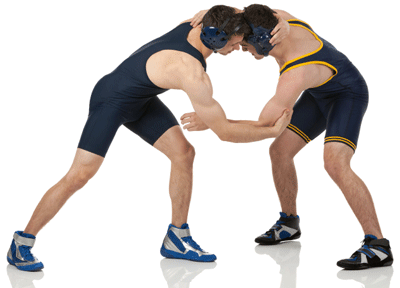PREVENTING WRESTLING INJURIES
PREVENTING WRESTLING INJURIES
Wrestling is one of the world’s oldest sports and is offered at various levels of competition. Athletes are paired against each other according to their weight class. This decreases the risk for injury. The most common injuries that occur are to the knee, shoulder, skin, and head.

Most Common Injuries
- Concussions
- Abrasions
- Contusions
- Cuts
- Cauliflower Ear
· Knee and Shoulder injuries occur with more severity and are responsible for the most lost time, surgeries, and treatment
Cauliflower ears - Caused by severe bruising of the ear structure. When this occurs the injury may need to be drained and the ear wrapped in a casting material. Wearing properly fitted headgear is the best way to prevent this injury.
Concussions – Wearing headgear with a frontal pad can help minimize the impact of the forehead and can help prevent concussions. Wearing a mouth guard can not only prevent tongue and tooth injuries, but can also help to prevent concussions.
Prepatellar Bursitis – Inflammation of the bursa sac in the front of the kneecap. This injury is a result of constant contact with the mat. This can result in sharp pain and swelling. This is treated with NSAID’s such as ibuprofen, ice, and rest. The use of knee pads can help to prevent this injury or make it more manageable once it occurs.
Ligament Injuries – Most common are to the MCL or LCL. These injuries are the result of the knee twisting outward from the midline of the body. A 1st degree sprain can be treated with Rest, Ice, Compression, and Elevation. Often times an athlete can return to play quickly as the pain subsides. If the sprain is more severe, the athlete will need to be treated by a physician, although surgical intervention is rare. Prevent these injuries by maintaining good quad and hamstring strength, as well as flexibility.
Skin Infections – Wrestlers can suffer from skin infections, and they can spread from all the skin-to-skin contact. Some of the main infections in wrestling are herpes simplex, ringworm, and impetigo. However, MRSA, which is much more serious, can also occur.
Minimize the risk of a skin infection by:
- Practicing good hygiene
- Taking showers before and after practice/matches
- Wearing clean clothing
- Sanitizing mats and gear
If you suspect an infection, see your athletic trainer. If it is an infection, you will need to see your physician promptly to get a prescription for antibiotics. When infected, should avoid bodily contact until it is resolved.
Monitoring Weight Control – This can be achieved through proper control of diet and sound nutritional advice. New York goes through minimum weight certifications in order to establish a weight that is safe for each wrestler to participate at. This is calculated based on weight and percent body fat. All wrestlers must pass a hydration test prior to certification.
Preventing Injuries
- Promoting Good Hygiene
- Taking care of minor injuries before they become more significant
- Proper Technique
- Solid Strength and Conditioning Program
- Proper, well-fitted equipment (knee pads, head gear, etc)
- Clean Mats
- Proper Officiating
3912